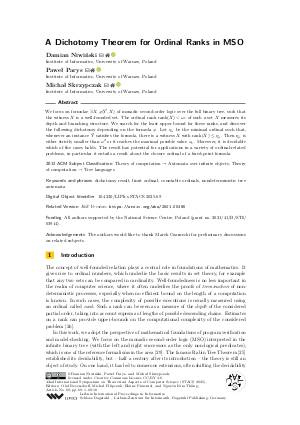LIPIcs.STACS.2025.69.pdf
- Filesize: 0.83 MB
- 18 pages

 Creative Commons Attribution 4.0 International license
Creative Commons Attribution 4.0 International license

We focus on formulae ∃X.φ(Y, X) of monadic second-order logic over the full binary tree, such that the witness X is a well-founded set. The ordinal rank rank(X) < ω₁ of such a set X measures its depth and branching structure. We search for the least upper bound for these ranks, and discover the following dichotomy depending on the formula φ. Let η_φ be the minimal ordinal such that, whenever an instance Y satisfies the formula, there is a witness X with rank(X) ≤ η_φ. Then η_φ is either strictly smaller than ω² or it reaches the maximal possible value ω₁. Moreover, it is decidable which of the cases holds. The result has potential for applications in a variety of ordinal-related problems, in particular it entails a result about the closure ordinal of a fixed-point formula.




Feedback for Dagstuhl Publishing